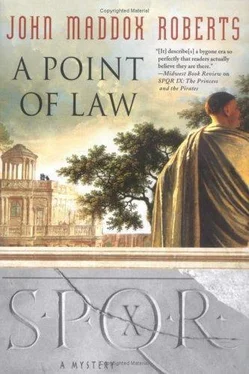John Roberts - A Point of Law
Здесь есть возможность читать онлайн «John Roberts - A Point of Law» весь текст электронной книги совершенно бесплатно (целиком полную версию без сокращений). В некоторых случаях можно слушать аудио, скачать через торрент в формате fb2 и присутствует краткое содержание. Год выпуска: 0101, ISBN: 0101, Издательство: St. Martin, Жанр: Исторический детектив, на английском языке. Описание произведения, (предисловие) а так же отзывы посетителей доступны на портале библиотеки ЛибКат.
- Название:A Point of Law
- Автор:
- Издательство:St. Martin
- Жанр:
- Год:0101
- ISBN:9780312337254
- Рейтинг книги:5 / 5. Голосов: 1
-
Избранное:Добавить в избранное
- Отзывы:
-
Ваша оценка:
- 100
- 1
- 2
- 3
- 4
- 5
A Point of Law: краткое содержание, описание и аннотация
Предлагаем к чтению аннотацию, описание, краткое содержание или предисловие (зависит от того, что написал сам автор книги «A Point of Law»). Если вы не нашли необходимую информацию о книге — напишите в комментариях, мы постараемся отыскать её.
A Point of Law — читать онлайн бесплатно полную книгу (весь текст) целиком
Ниже представлен текст книги, разбитый по страницам. Система сохранения места последней прочитанной страницы, позволяет с удобством читать онлайн бесплатно книгу «A Point of Law», без необходимости каждый раз заново искать на чём Вы остановились. Поставьте закладку, и сможете в любой момент перейти на страницу, на которой закончили чтение.
Интервал:
Закладка:
“So who is behind him?” Sallustius said, as insinuatingly as always. “You know Cicero’s dictum: A cui bono? To whom goes the benefit? Who is behind him? Who stands to gain if he becomes Caesar’s heir? Who would absolutely not want to see Fulvius’s silly plan come to anything? Assuming, as we both do, that the various Claudii Marcelli bankrolled him and put him up to it in the first place as a means to undermine Caesar, who would be in a position to know what was going on in that house?”
A few things fell into place. “Octavia.”
He nodded. “The boy’s sister and wife of Caius Claudius Marcellus. Who was their father?”
“The elder Caius Octavius.”
“And what do we know about him?”
“He was praetor a few years back,” I said, searching my memory. “I believe he was the first of his family to reach the praetorship. He did a decent job of governing Macedonia as his propraetorian province. Nobody accused him of corruption.”
“Yes, by all accounts a good and honorable man. Do you know who his forebears were?”
“My wife keeps excellent track of these things,” I said. “I don’t.”
“The family is from Velitrae, in the Volscian country. His father was a banker of that city. He married his son to Atia, the daughter of Caesar’s sister, who was the wife of Atius Balbus, another banker of Velitrae. Balbus was of great aid to Caesar in his penurious years. So Caesar’s probable heir and his sister’s are the grandchildren of bankers on both sides. Think of it: An attack on bankers, an attack on Caesar’s power base-these things would not be to the advantage of Octavia’s little brother.”
“So you think she subverted Marcus Fulvius, drew him away from her husband and the other Marcelli? But how?”
He slapped his hands against his knees and rose from his chair. “I didn’t say I knew everything. I’m just telling you where you should be looking. You are the one who is supposed to be good at this sort of thing.”
I rose as well. “I thank you for this information, Sallustius.” I tried not to make it sound too grudging. “This has been most illuminating, and you shall have your interview.”
“If you live,” he said cheerily.
We went outside and stood for a moment in the shade of the great portico. Off to the east end of the portico we could see the whole length of the Forum. Out there, near the meeting place of the comitia, I saw a man with his head turbanned in bloodstained bandages, surrounded by a crowd of belligerent-faced men, some of them wielding staves and cudgels.
“Curio has acquired protectors,” I noted.
Sallustius smiled benignly. “Are you familiar with the story of Pisistratus?”
“All I remember is that he was tyrant of Athens.” We walked down the steps and turned toward the Forum.
“He was a politician and soldier of some account, but merely one among many such. One day he appeared in the agora heavily bandaged, and claimed that he had been set upon by ruffians in the hire of the aristocrats. He petitioned the assembly to be allowed a bodyguard of armed men, and this was granted in an access of antiaristocratic fervor. Somehow this bodyguard kept growing until Pisistratus completely overawed the citizenry and eventually made himself tyrant, which position he enjoyed for a good many years.”
Sallustius turned to me and smiled again, less benignly this time. “It is the opinion of all rational historians that the wounds suffered by Pisistratus were self-inflicted.”
“Our friend Curio would never do anything so underhanded,” I asserted. Then we both had a good laugh over that one.
Sallustius wandered off and left me with some heavy thoughts to ponder. I shook hands and cadged votes bemusedly for a while, assessing the possibilities in the light of this new evidence, if evidence it was, and not just some fancy of Sallustius, who was never above playing his own political games.
The sun was just touching the rooftops on the west side of the Forum when a Greek slave boy ran up to me.
“You are the Senator Metellus?” he asked with a heavy Alexandrian accent.
“I’m one of them. Decius the Younger by name.”
“My mistress, Callista, sends you this.”
He handed me a folded piece of papyrus. I opened it and saw a single, oversized Greek letter: Delta. Below that, in small, neat letters, was a single Latin word: Done.
12
I found the two of them, Julia and Callista, relaxing amid a great litter of papers and scrolls, looking absurdly happy and satisfied with themselves. They were celebrating with a bit of wine, which they were drinking from, of all things, Thracian rhytons; those strange drinking horns made of silver with the bases in the form of animal or human heads. Callista beamed at me and handed me one. Its horn part was delicately fluted, the base representing a ram, its curling horns and dense wool exquisitely molded.
“Bit of a departure from philosophical simplicity,” I noted. I took a sip and tried not to wince. It was one of those Greek wines flavored with resin that I have always found disagreeable.
“They were a gift from a Thracian nobleman who attended a course of my lectures at the Museum,” Callista said. “I only bring them out for special occasions.”
“Well, if this isn’t a special occasion,” I said, “then I don’t know what constitutes one. Breaking a code is a unique sort of accomplishment.”
“I don’t know when I’ve enjoyed anything so much,” she said, with apparent sincerity.
“What have you learned?” I asked.
Julia took up a small sheaf of papers. “We could have hoped for more. No names of the conspirators were used, probably for security’s sake, but probably also because they were scarcely needed, since only a tiny circle of plotters were involved. Also they are not dated. Again because the participants would know when they were written and received. These were never intended for future reference.”
“Marcus Fulvius intended to use them in the future,” I said.
“How so?” Julia asked.
“That he intended to use them at some future date I deduce from the fact that he didn’t destroy them after reading, which is what you usually do with incriminating documents. As to his motive, since he intended to be a great man, he may have wanted them for his memoirs, which he fancied would have an audience. Or, more likely, he may have intended to use them for blackmail purposes, or as insurance in case the others should someday turn against him, as I now believe they did.”
“I never would have thought of those things,” Callista admitted, “yet I find your logic impeccable, and your grasp of the various possible alternatives comprehensive. Most people who have not been trained in philosophy and logic form a single opinion, usually based on prejudice or emotion, and adhere to it stubbornly.”
“This is what makes my husband the-singular sort of person he is,” said my loving wife.
“But he employs his gift in a unique way,” said Callista. “Give me a problem of mathematics, of the nature of the universe, of natural history, or the nature of beauty, and I will bring to bear upon it all the resources of five hundred years of philosophical thought, from Heraclitus to the present day. But, confronted with the problems of human passion, of ambition, greed, lust for power, jealousy, and simple stupidity, I am as helpless as a child. Such things do not yield to analysis and philosophical rigor.”
“That,” Julia told her, “is because you have lived your life in an elevated world of the mind, where thought is the highest joy. Decius, to the contrary, is intimately familiar with all these things.”
“Well, what do we have here?” I asked, a little put out at Julia’s fulsome praise of the philosophical world. I had spent some time at the Museum of Alexandria and so had she. Among the teachers there we had found no shortage of pettiness, jealousy, and ambition.
Читать дальшеИнтервал:
Закладка:
Похожие книги на «A Point of Law»
Представляем Вашему вниманию похожие книги на «A Point of Law» списком для выбора. Мы отобрали схожую по названию и смыслу литературу в надежде предоставить читателям больше вариантов отыскать новые, интересные, ещё непрочитанные произведения.
Обсуждение, отзывы о книге «A Point of Law» и просто собственные мнения читателей. Оставьте ваши комментарии, напишите, что Вы думаете о произведении, его смысле или главных героях. Укажите что конкретно понравилось, а что нет, и почему Вы так считаете.









